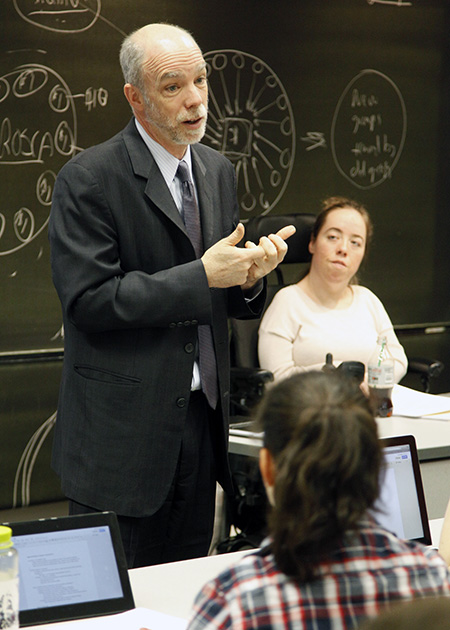By Max Pearlstein ’01

In his role as executive director of the Massachusetts Health Policy Forum (MHPF), Michael Doonan oversees a network of events and initiatives that share a common goal for the Commonwealth: improving the health of both state residents and the Massachusetts health care system.
As its name implies, the MHPF, which is housed at Brandeis University and the Heller School, presents forums on critical and timely health issues—but its work doesn’t stop there. Doonan, who also directs Heller’s Master of Public Policy program, works with forum partners to publish op-eds, offer special briefings for the legislature and organize ongoing conversations on topics ranging from healthy aging to assessing the continuum of care for severe brain injury.
“We used to have a policy of one and done. We’d have one forum on a particular issue and then move on to the next one, but we were moving on so quickly we didn’t know what our impact was,” Doonan says. “We’ve changed our model to have multiple forums and multiple events around one area because we found that the more time stakeholders spent together, the greater the opportunity for making a difference.”
One example is childhood obesity. Doonan and his colleagues held a series of related events around the topic, starting with a theoretical debate between Paul Campos, author of The Obesity Myth and Dr. Kelly Brownell, the foremost public health expert on the topic. That initial forum was followed by another session, this time on information sharing, featuring best anti-obesity programs and practices from Massachusetts and around the country. For the third event, the commissioner of public health collaborated with MHPF to roll out Mass in Motion, a major state initiative to support local communities to promote an active lifestyle and healthy eating. Finally, the forum organized a meeting on childhood brain development just as the state legislature was considering policy that would roll back recess in schools.

“As we discussed at that last event, it turns out that if you add another math class, it doesn’t help,” Doonan says. “Being active is really important to brain development and success in the classroom. That forum came at a critical time when the legislature was making an important decision that would affect this issue. It helped influence lawmakers to protect recess because it connected physical activity with students’ academic performance.”
One of the MHPF initiatives that Doonan is most proud of is its annual forum for Boston-area medical school students and students in public heath, health policy and health management programs. “They hear from 28 speakers over two days,” Doonan says. “We start in the legislature, where staffers give them a behind-the-scenes look at how the legislature enacts health policy and how they work with consumer advocacy organizations, health plans and hospitals. Then we meet with top officials from government agencies ranging from Medicaid to the Health Connector, which is Massachusetts’ marketplace for insurance reform. We meet with the commissioner of public health. We meet with the secretary of human services. For these students who will be helping to shape critical health issues in the future, this is a chance for them to see, up close and personal, how health policy operates and runs. So much of it depends on bringing the right people together.”
This story originally appeared in the spring 2017 Heller Social Policy Impact Report.
